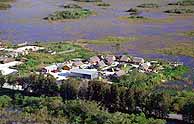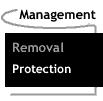
 Wetlands:
Management--Removal
Wetlands:
Management--Removal
Before their ecological importance was discovered, wetlands were considered to be wasted land.
They were actively removed in order to clear land for human use. Wetlands removal was accomplished by draining the areas, filling them with soil, and/or diverting water away from them. Years of sedimentation resulted in extremely fertile soils within some wetlands. Many of them were drained and converted to croplands. The land was developed for residential and commercial purposes as well.
Photo: Indian Village, Tamiami Trail. Photo courtesy of South Florida Water Management District.
Developers have also been responsible for the passive removal of wetlands as a result of cutting off the flow of water into them. Developers alter the path of water flow for many reasons: residential needs, business and industrial needs, agricultural needs, and flood protection. When the natural flow of water is diverted away from a wetlands, the ecosystem dries up and disappears.
In addition to removing wetlands by actively or passively restricting the flow of water through them, people have destroyed these ecosystems by polluting them. Wetlands are natural water filtration systems. They can be used for the treatment of wastewater, agricultural runoff, and acid mine drainage. However, when these pollutants become too concentrated, they begin to degrade the wetland itself. This problem occurs in areas where too many pollutants are allowed to flow through a wetlands. The loss of wetlands means the loss of nature's
kidneys--the areas that filter impurities from water as it flows from terrestrial ecosystems to the open sea.
The removal of wetlands has also resulted in the loss of habitat for many unique
species of microorganisms, plants and animals. This loss of habitat has led to a decrease in
biodiversity and the near extinction of many of these organisms.
Removal / Protection
Home ..|.. Teacher Pages ..|.. Modules & Activities
HTML code by Chris
Kreger
Maintained by ETE Team
Last updated
April 28, 2005
Some images © 2004 www.clipart.com
Privacy Statement and Copyright © 1997-2004 by Wheeling Jesuit University/NASA-supported Classroom of the Future. All rights reserved.
Center for Educational Technologies, Circuit Board/Apple graphic logo, and COTF Classroom of the Future logo are registered trademarks of Wheeling Jesuit University.

